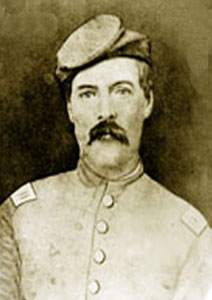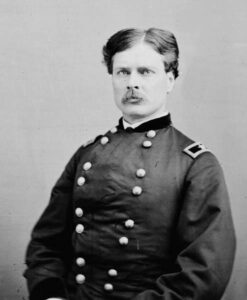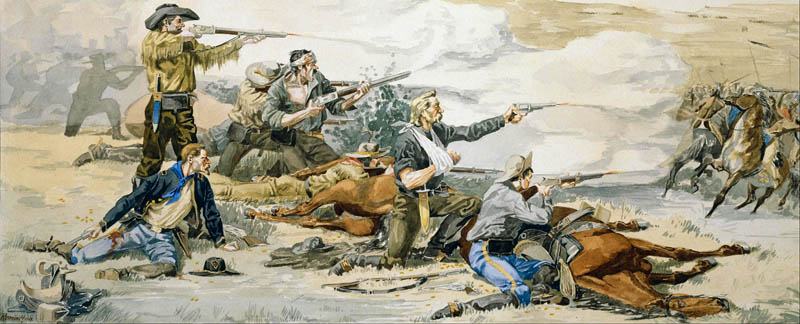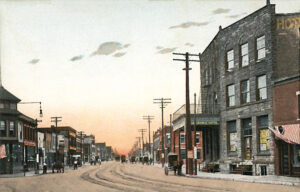One of Kansas‘ most outstanding soldiers, Captain Allison J. Pliley, was famous as a scout and cavalry officer in the frontier days.
Allison J. Pliley, also known as John or A.J., was born April 20, 1844, in Ross County, Ohio, to John and Mary S. Waddle Pliley. He was the youngest of six children. In about 1856, the Pliley family moved to Soldier Township, north of Topeka, Shawnee County, Kansas.
Pliley began serving in the Kansas military forces on September 16, 1863, when he enlisted in F Company, 15th Kansas Volunteer Cavalry. During the Civil War, he progressed through the ranks, serving as a corporal, 1st sergeant, and second lieutenant, and participating in engagements in Missouri and Kansas against the forces of Confederate Major General Sterling Price.
Discharged from service on July 31, 1865, he returned to civilian life in rural Topeka, where he began studying law. In 1867, there were numerous reports of theft, murder, rape, and kidnapping of settlers by Indian warriors, and Governor Samuel Crawford called for volunteers to form the 18th Kansas Volunteer Cavalry. Pliley volunteered and served as a civilian scout for this unit and, despite his civilian capacity, was lauded by witnesses for his leadership, including commanding units.
On August 21, 1867, Pliley was at the Battle of Prairie Dog Creek, in the northwest corner of Phillips County, near the cities of Phillipsburg and Norton, Kansas. This battle involved the 18th Kansas Volunteer Cavalry, a unit of Kansas soldiers activated to assist the U.S. Army. Although shot twice during the battle, he continued fighting and rallying troops, and later made an incredibly brave dash in the face of several hundred Indians for help.
Not long after his services were complete with the 18th Kansas, Pliley joined Colonel George A. Forsyth’s Scouts at Fort Hays, Kansas. Forsyth’s command went in pursuit when word came of a massacre near Willow Springs, Colorado. From where they found bodies and wagons of emigrants, they rode to the Republican River and met the Indians, where the Arikaree River joined that stream. There, the scouts spied about 1200 Indians, and after a night in camp, the little band of scouts found themselves surrounded on the land side of the camp. They crossed to Beechers Island and were entrenched as the Indians continued to attack. The bloody Battle of Beecher’s Island began on September 17, 1868, and 50 scouts held off 1,000 Indian warriors over a nine-day battle. Twenty-two scouts were wounded.
The battle took place near present-day Wray, Colorado. Pliley was one of four men who sneaked through enemy lines and traveled 73 miles on foot to Fort Wallace, Kansas, to arrange a rescue. Ironically, the commander of the troops who rode out to the battle, which was winding down by the time he arrived, later received the Medal of Honor. None of the four men who volunteered for the perilous mission and saved the unit, including Pliley, received the medal. Afterward, the battle was named for Lieutenant Fredrick H. Beecher, an army officer killed during the battle.
Following the fight at Beecher Island, Pliley fought in the Battle of the Washita, Oklahoma, on November 27, 1868, when Lieutenant Colonel George Armstrong Custer’s 7th U.S. Cavalry attacked and destroyed Cheyenne Chief Black Kettle’s camp on the Washita River. This was a six-month enlistment, and he served as a Captain.
Following his service with Forsyth’s Scouts, the governor commissioned Pliley as a captain and gave him command of Company A of the 19th Kansas Volunteer Cavalry. When the entire unit was lost during a blizzard, Pliley led a group of soldiers through the snow at night to seek help. The unit was finally saved from starvation and freezing to death. He served in this capacity from October 20, 1868, until April 18, 1869, and was consistently chosen to lead scouting and rescue details.
After serving with the 19th Kansas, Pliley was selected to command Company A, 2nd Frontier Battalion, formed after Indians raided several settlers’ homes in Lincoln County, Kansas. Pliley commanded over 80 men and 90 horses at the camp, known as Camp Pliley. Although no major battles occurred, the Indian hostilities in the area ceased while Camp Pliley was active.
Pliley eventually settled down and married Martha “Mattie” L. Young on July 30, 1871, and the couple would eventually have seven daughters. For several years, he worked in various jobs, including as a laborer and a painter. Eventually, however, the call of adventure got the best of him, and in 1876, he sent a letter to General George Custer, whom he had served alongside in 1868 and 1869, asking for a scouting job. Though it was slow in coming, he finally received a reply from Custer, offering Pliley the job. However, it was too late. Custer and his men had already started their mission, ending in the Battle of the Little Bighorn.
Pliley then worked various jobs but eventually made a living by dredging sand for contractors in downtown Kansas City, Kansas. In the winter, he would make money by cutting ice for storage. His home is in Armourdale, located in northern Kansas City.
On February 22, 1917, Captain Allison J. Pliley died at his home at 72. He was buried in the Quindaro Cemetery in Kansas City, Kansas.
“Mr. Pliley was one of the most effective scouts and one of the best cavalry officers of the day, but he is very modest and never would push himself forward or toot his own horn… Forty years ago, courage was unnoticed — it was taken for granted on the plains, but Pliley’s courage was noticeably different from that of his fellows. He delighted in a desperate situation. He was a natural leader… Pliley always took the hard end of a job.”
— A fellow soldier who had campaigned across the Plains of Kansas.
©Kathy Alexander/Legends of Kansas, updated January 2026.
Also See:
Camp Pliley in Lincoln County, Kansas
Soldiers and Officers in American History
Sources:
Find-a-Grave
Kansas National Guard Museum
The Kansas City Star, September 5, 1909




